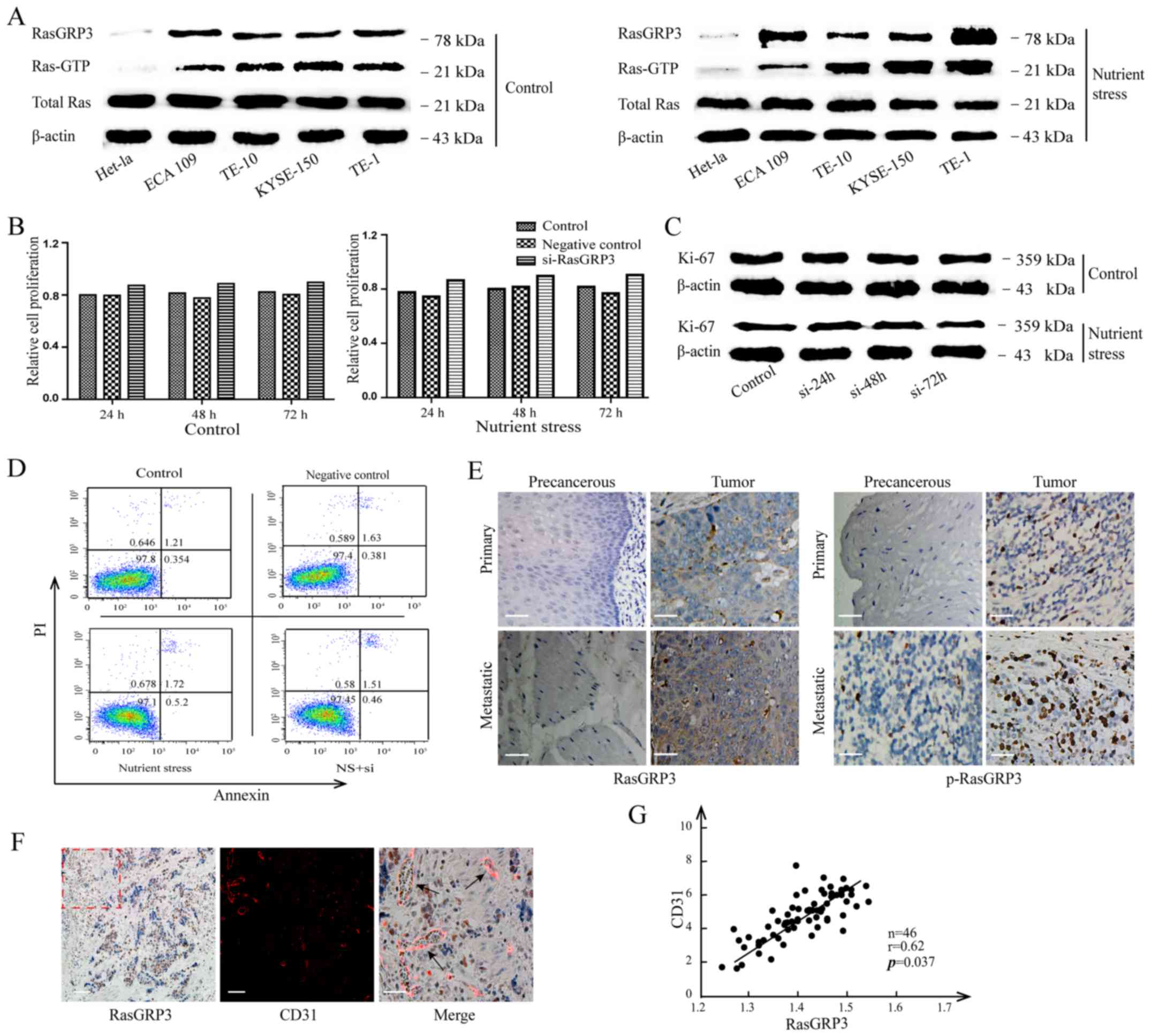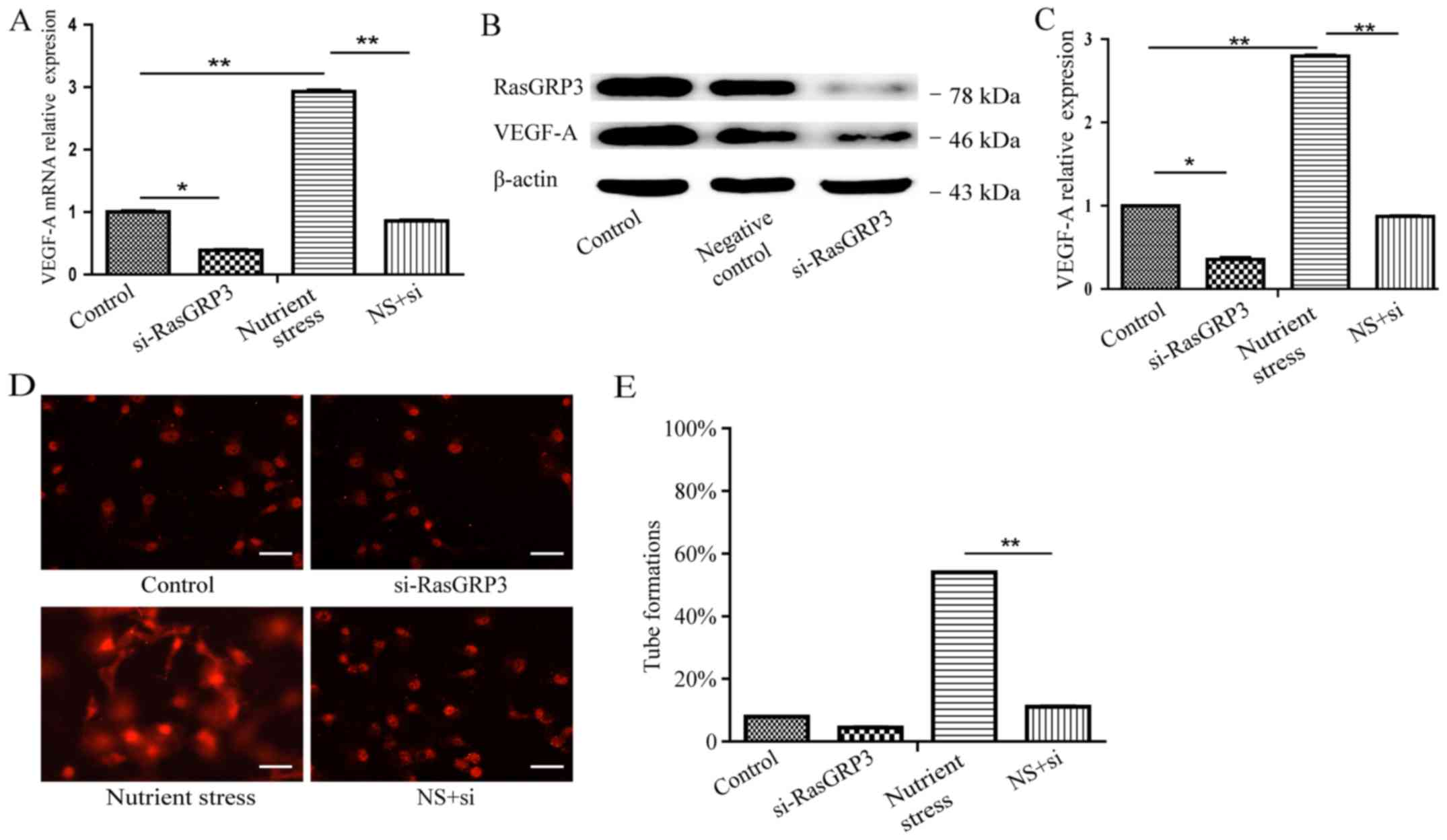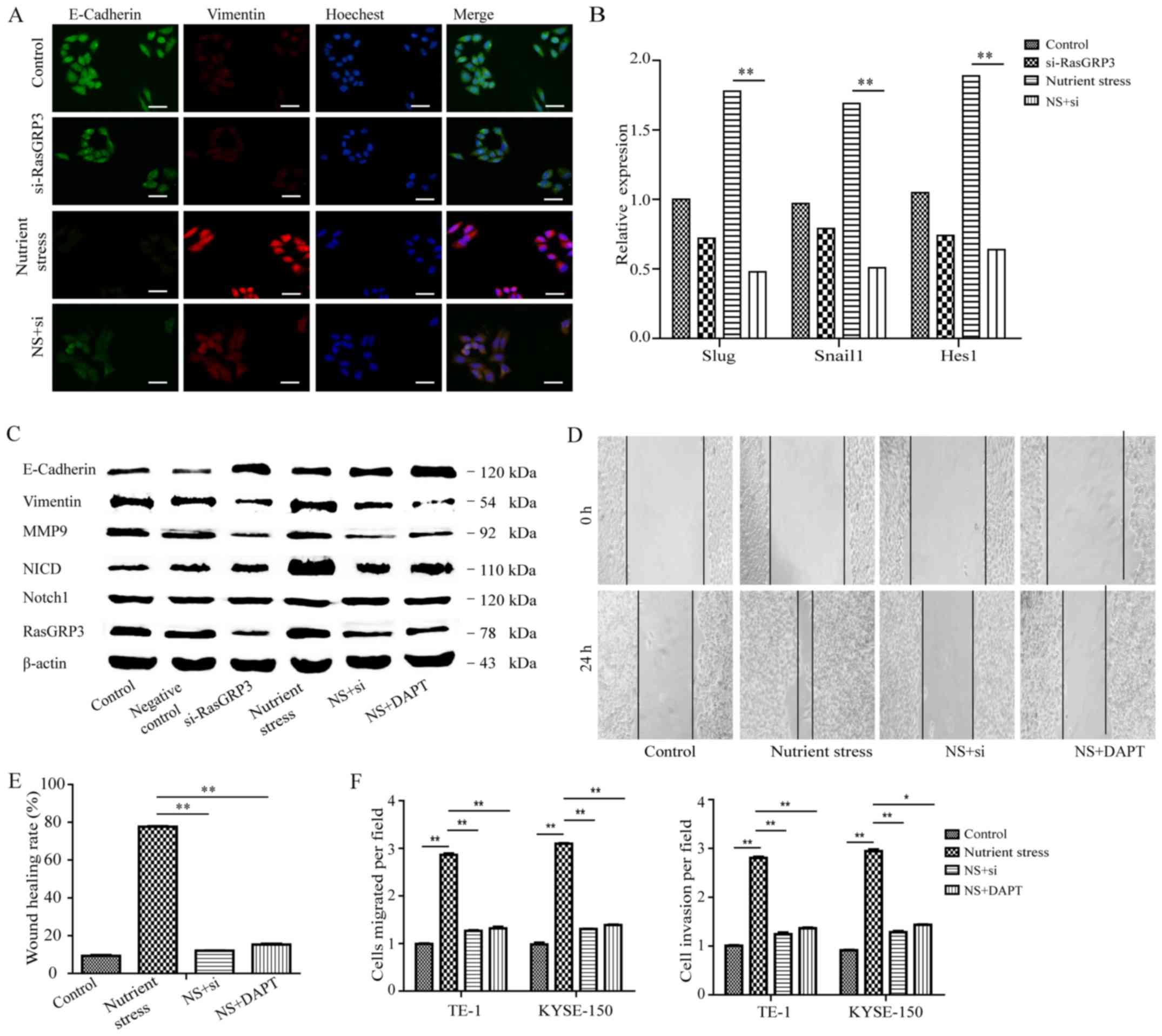|
1
|
Ferlay J, Shin HR, Bray F, Forman D,
Mathers C and Parkin DM: Estimates of worldwide burden of cancer in
2008: GLOBOCAN 2008. Int J Cancer. 127:2893–2917. 2010. View Article : Google Scholar : PubMed/NCBI
|
|
2
|
Siegel RL, Miller KD and Jemal A: Cancer
statistics, 2015. CA Cancer J Clin. 65:5–29. 2015. View Article : Google Scholar : PubMed/NCBI
|
|
3
|
Chen MF, Yang YH, Lai CH, Chen PC and Chen
WC: Outcome of patients with esophageal cancer: A nationwide
analysis. Ann Surg Oncol. 20:3023–3030. 2013. View Article : Google Scholar : PubMed/NCBI
|
|
4
|
Lin Y, Totsuka Y, He Y, Kikuchi S, Qiao Y,
Ueda J, Wei W, Inoue M and Tanaka H: Epidemiology of esophageal
cancer in Japan and China. J Epidemiol. 23:233–242. 2013.
View Article : Google Scholar : PubMed/NCBI
|
|
5
|
Wu C, Hu Z, He Z, Jia W, Wang F, Zhou Y,
Liu Z, Zhan Q, Liu Y, Yu D, et al: Genome-wide association study
identifies three new susceptibility loci for esophageal
squamous-cell carcinoma in Chinese populations. Nat Genet.
43:679–684. 2011. View
Article : Google Scholar : PubMed/NCBI
|
|
6
|
Akakura N, Kobayashi M, Horiuchi I, Suzuki
A, Wang J, Chen J, Niizeki H, Kawamura K, Hosokawa M and Asaka M:
Constitutive expression of hypoxia-inducible factor-1alpha renders
pancreatic cancer cells resistant to apoptosis induced by hypoxia
and nutrient deprivation. Cancer Res. 61:6548–6554. 2001.PubMed/NCBI
|
|
7
|
Catalano V, Turdo A, Di Franco S, Dieli F,
Todaro M and Stassi G: Tumor and its microenvironment: A
synergistic interplay. Semin Cancer Biol. 23:522–532. 2013.
View Article : Google Scholar : PubMed/NCBI
|
|
8
|
Ghosh R, Lipson KL, Sargent KE, Mercurio
AM, Hunt JS, Ron D and Urano F: Transcriptional regulation of
VEGF-A by the unfolded protein response pathway. PLoS One.
5:e95752010. View Article : Google Scholar : PubMed/NCBI
|
|
9
|
Horsman MR and Vaupel P:
Pathophysiological basis for the formation of the tumor
microenvironment. Front Oncol. 6:662016. View Article : Google Scholar : PubMed/NCBI
|
|
10
|
Kranenburg O, Gebbink MF and Voest EE:
Stimulation of angiogenesis by Ras proteins. Biochim Biophys Acta.
1654:23–37. 2004.PubMed/NCBI
|
|
11
|
Ojha R, Bhattacharyya S and Singh SK:
Autophagy in Cancer stem cells: A potential link between
chemoresistance, recurrence, and metastasis. Biores Open Access.
4:97–108. 2015. View Article : Google Scholar : PubMed/NCBI
|
|
12
|
Xu Y, Xia X and Pan H: Active autophagy in
the tumor microenvironment: A novel mechanism for cancer
metastasis. Oncol Lett. 5:411–416. 2013.PubMed/NCBI
|
|
13
|
Etienne-Manneville S and Hall A: Rho
GTPases in cell biology. Nature. 420:629–635. 2002. View Article : Google Scholar : PubMed/NCBI
|
|
14
|
Stone JC: Regulation of Ras in
lymphocytes: Get a GRP. Biochem Soc Trans. 34:858–861. 2006.
View Article : Google Scholar : PubMed/NCBI
|
|
15
|
Downward J: Targeting RAS signalling
pathways in cancer therapy. Nat Rev Cancer. 3:11–22. 2003.
View Article : Google Scholar : PubMed/NCBI
|
|
16
|
Kolch W: Meaningful relationships: The
regulation of the Ras/Raf/MEK/ERK pathway by protein interactions.
Biochem J. 351:289–305. 2000. View Article : Google Scholar : PubMed/NCBI
|
|
17
|
Zuber J, Tchernitsa OI, Hinzmann B,
Schmitz AC, Grips M, Hellriegel M, Sers C, Rosenthal A and Schäfer
R: A genome-wide survey of RAS transformation targets. Nat Genet.
24:144–152. 2000. View
Article : Google Scholar : PubMed/NCBI
|
|
18
|
Garcia LC, Donadío LG, Mann E, Kolusheva
S, Kedei N, Lewin NE, Hill CS, Kelsey JS, Yang J, Esch TE, et al:
Synthesis, biological, and biophysical studies of
DAG-indololactones designed as selective activators of RasGRP.
Bioorg Med Chem. 22:3123–3140. 2014. View Article : Google Scholar : PubMed/NCBI
|
|
19
|
Hennig A, Markwart R, Esparza-Franco MA,
Ladds G and Rubio I: Ras activation revisited: Role of GEF and GAP
systems. Biol Chem. 396:831–848. 2015. View Article : Google Scholar : PubMed/NCBI
|
|
20
|
Roberts PJ and Der CJ: Targeting the
Raf-MEK-ERK mitogen-activated protein kinase cascade for the
treatment of cancer. Oncogene. 26:3291–3310. 2007. View Article : Google Scholar : PubMed/NCBI
|
|
21
|
Frau M, Feo F and Pascale RM: Pleiotropic
effects of methionine adenosyltransferases deregulation as
determinants of liver cancer progression and prognosis. J Hepatol.
59:830–841. 2013. View Article : Google Scholar : PubMed/NCBI
|
|
22
|
Lee HK, Finniss S, Cazacu S, Xiang C,
Poisson LM, Blumberg PM and Brodie C: RasGRP3 regulates the
migration of glioma cells via interaction with Arp3. Oncotarget.
6:1850–1864. 2015. View Article : Google Scholar : PubMed/NCBI
|
|
23
|
Nagy Z, Kovács I, Török M, Tóth D, Vereb
G, Buzás K, Juhász I, Blumberg PM, Bíró T and Czifra G: Function of
RasGRP3 in the formation and progression of human breast cancer.
Mol Cancer. 13:962014. View Article : Google Scholar : PubMed/NCBI
|
|
24
|
Porpaczy E, Bilban M, Heinze G, Gruber M,
Vanura K, Schwarzinger I, Stilgenbauer S, Streubel B, Fonatsch C
and Jaeger U: Gene expression signature of chronic lymphocytic
leukaemia with Trisomy 12. Eur J Clin Invest. 39:568–575. 2009.
View Article : Google Scholar : PubMed/NCBI
|
|
25
|
Teixeira C, Stang SL, Zheng Y, Beswick NS
and Stone JC: Integration of DAG signaling systems mediated by
PKC-dependent phosphorylation of RasGRP3. Blood. 102:1414–1420.
2003. View Article : Google Scholar : PubMed/NCBI
|
|
26
|
Yamagishi M, Katano H, Hishima T,
Shimoyama T, Ota Y, Nakano K, Ishida T, Okada S and Watanabe T:
Coordinated loss of microRNA group causes defenseless signaling in
malignant lymphoma. Sci Rep. 5:178682015. View Article : Google Scholar : PubMed/NCBI
|
|
27
|
Yang D, Kedei N, Li L, Tao J, Velasquez
JF, Michalowski AM, Tóth BI, Marincsák R, Varga A, Bíró T, et al:
RasGRP3 contributes to formation and maintenance of the prostate
cancer phenotype. Cancer Res. 70:7905–7917. 2010. View Article : Google Scholar : PubMed/NCBI
|
|
28
|
Yang D, Tao J, Li L, Kedei N, Tóth ZE,
Czap A, Velasquez JF, Mihova D, Michalowski AM, Yuspa SH, et al:
RasGRP3, a Ras activator, contributes to signaling and the
tumorigenic phenotype in human melanoma. Oncogene. 30:4590–4600.
2011. View Article : Google Scholar : PubMed/NCBI
|
|
29
|
Zeng X, Hu Z, Wang Z, Tao J, Lu T, Yang C,
Lee B and Ye Z: Upregulation of RASGRP3 expression in prostate
cancer correlates with aggressive capabilities and predicts
biochemical recurrence after radical prostatectomy. Prostate Cancer
Prostatic Dis. 17:119–125. 2014. View Article : Google Scholar : PubMed/NCBI
|
|
30
|
Weijzen S, Rizzo P, Braid M, Vaishnav R,
Jonkheer SM, Zlobin A, Osborne BA, Gottipati S, Aster JC, Hahn WC,
et al: Activation of Notch-1 signaling maintains the neoplastic
phenotype in human Ras-transformed cells. Nat Med. 8:979–986. 2002.
View Article : Google Scholar : PubMed/NCBI
|
|
31
|
Takebe N, Nguyen D and Yang SX: Targeting
notch signaling pathway in cancer: Clinical development advances
and challenges. Pharmacol Ther. 141:140–149. 2014. View Article : Google Scholar : PubMed/NCBI
|
|
32
|
Ogawa R, Ishiguro H, Kimura M, Funahashi
H, Wakasugi T, Ando T, Shiozaki M and Takeyama H: NOTCH1 expression
predicts patient prognosis in esophageal squamous cell cancer.
European surgical research. Eur Surg Res. 51:101–107. 2013.
View Article : Google Scholar : PubMed/NCBI
|
|
33
|
Lim SOI, Gu JM, Kim MS, Kim HS, Park YN,
Park CK, Cho JW, Park YM and Jung G: Epigenetic changes induced by
reactive oxygen species in hepatocellular carcinoma: methylation of
the E-cadherin promoter. Gastroenterology. 135:2128–2140,
2140.e2121-2128. 2008. View Article : Google Scholar : PubMed/NCBI
|
|
34
|
Sahlgren C, Gustafsson MV, Jin S,
Poellinger L and Lendahl U: Notch signaling mediates
hypoxia-induced tumor cell migration and invasion. Proc Natl Acad
Sci USA. 105:pp. 6392–6397. 2008; View Article : Google Scholar : PubMed/NCBI
|
|
35
|
Shao S and Zhao X, Zhang X, Luo M, Zuo X,
Huang S, Wang Y, Gu S and Zhao X: Notch1 signaling regulates the
epithelial-mesenchymal transition and invasion of breast cancer in
a Slug-dependent manner. Mol Cancer. 14:282015. View Article : Google Scholar : PubMed/NCBI
|
|
36
|
Benedito R, Roca C, Sörensen I, Adams S,
Gossler A, Fruttiger M and Adams RH: The notch ligands Dll4 and
Jagged1 have opposing effects on angiogenesis. Cell. 137:1124–1135.
2009. View Article : Google Scholar : PubMed/NCBI
|
|
37
|
Noguera-Troise I, Daly C, Papadopoulos NJ,
Coetzee S, Boland P, Gale NW, Lin HC, Yancopoulos GD and Thurston
G: Blockade of Dll4 inhibits tumour growth by promoting
non-productive angiogenesis. Nature. 444:1032–1037. 2006.
View Article : Google Scholar : PubMed/NCBI
|
|
38
|
Dorneburg C, Goß AV, Fischer M, Roels F,
Barth TF, Berthold F, Kappler R, Oswald F, Siveke JT, Molenaar JJ,
et al: γ-Secretase inhibitor I inhibits neuroblastoma cells, with
NOTCH and the proteasome among its targets. Oncotarget.
7:62799–62813. 2016. View Article : Google Scholar : PubMed/NCBI
|
|
39
|
Chen D, Li W, Liu S, Su Y, Han G, Xu C,
Liu H, Zheng T, Zhou Y and Mao C: Interleukin-23 promotes the
epithelial-mesenchymal transition of oesophageal carcinoma cells
via the Wnt/β-catenin pathway. Sci Rep. 5:86042015. View Article : Google Scholar : PubMed/NCBI
|
|
40
|
Roberts DM, Anderson AL, Hidaka M,
Swetenburg RL, Patterson C, Stanford WL and Bautch VL: A vascular
gene trap screen defines RasGRP3 as an angiogenesis-regulated gene
required for the endothelial response to phorbol esters. Mol Cell
Biol. 24:10515–10528. 2004. View Article : Google Scholar : PubMed/NCBI
|
|
41
|
Ferrara N, Gerber HP and LeCouter J: The
biology of VEGF and its receptors. Nat Med. 9:669–676. 2003.
View Article : Google Scholar : PubMed/NCBI
|
|
42
|
Meng F and Wu G: The rejuvenated scenario
of epithelial-mesenchymal transition (EMT) and cancer metastasis.
Cancer Metastasis Rev. 31:455–467. 2012. View Article : Google Scholar : PubMed/NCBI
|
|
43
|
Yuan Y, Hu Y, Zhao Y and Chen L:
Expressions of Notch signaling-associated proteins in esophageal
squamous cell carcinoma. Zhonghua Wei Chang Wai Ke Za Zhi.
18:909–913. 2015.(In Chinese). PubMed/NCBI
|













